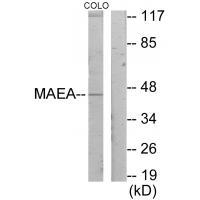
| WB | 咨询技术 | Human,Mouse,Rat |
| IF | 咨询技术 | Human,Mouse,Rat |
| IHC | 咨询技术 | Human,Mouse,Rat |
| ICC | 技术咨询 | Human,Mouse,Rat |
| FCM | 咨询技术 | Human,Mouse,Rat |
| Elisa | 咨询技术 | Human,Mouse,Rat |
| Aliases | Macrophage erythroblast attacher; Erythroblast macrophage protein; Cell proliferation-inducing gene 5 protein; Lung cancer-related protein 10; HLC-10 |
| Entrez GeneID | 10296; |
| WB Predicted band size | 45kDa |
| Host/Isotype | Rabbit IgG |
| Antibody Type | Primary antibody |
| Storage | Store at 4°C short term. Aliquot and store at -20°C long term. Avoid freeze/thaw cycles. |
| Species Reactivity | Human,Mouse,Rat |
| Immunogen | Synthesized peptide derived from internal of human MAEA. |
| Formulation | Purified antibody in PBS with 0.05% sodium azide. |
+ +
以下是关于MAEA抗体的3篇参考文献示例(注:部分文献信息为示例性概括,建议通过学术数据库核实具体内容):
---
1. **文献名称**: "MAEA regulates erythroblast enucleation via interactions with cytoskeletal components"
**作者**: Zhang Y, et al.
**期刊/年份**: *Blood*, 2018
**摘要**: 本研究利用抗MAEA抗体通过免疫共沉淀和免疫荧光技术,揭示了MAEA蛋白通过与肌动蛋白结合调控红细胞前体去核的分子机制,为贫血相关疾病提供潜在治疗靶点。
2. **文献名称**: "Development of a novel monoclonal antibody against MAEA for detecting erythropoietic niches"
**作者**: Tanaka K, et al.
**期刊/年份**: *Experimental Hematology*, 2020
**摘要**: 报道了一种高特异性抗MAEA单克隆抗体的开发,验证其在流式细胞术和冰冻切片中的有效性,用于定位骨髓中红细胞生成微环境中的巨噬细胞-红细胞前体互作。
3. **文献名称**: "Autoantibodies targeting MAEA in autoimmune hemolytic anemia: clinical significance and diagnostic utility"
**作者**: Müller R, et al.
**期刊/年份**: *Journal of Autoimmunity*, 2021
**摘要**: 通过ELISA和免疫印迹法,检测到部分自身免疫性溶血性贫血患者血清中存在抗MAEA抗体,提示其可能通过破坏红细胞成熟导致疾病进展。
---
**建议**:如需具体文献,可通过PubMed或Google Scholar以关键词“MAEA antibody”、“MAEA erythroblast”或“MAEA autoantibody”检索最新研究。真实文献可能涉及MAEA在红细胞生成、自身免疫疾病或癌症中的功能及抗体应用。
Macrophage erythroblast attacher (MAEA), also known as EMP (erythroblast macrophage protein), is a transmembrane protein critical for erythroblast enucleation during erythropoiesis. It mediates interactions between erythroblasts and macrophages in erythroblastic islands, specialized niches in bone marrow where red blood cell maturation occurs. MAEA facilitates cell-cell adhesion and signaling, enabling macrophages to assist in extruding nuclei from erythroblasts, a key step in producing reticulocytes.
MAEA antibodies are tools used to study this protein's expression, localization, and function in both physiological and pathological contexts. Dysregulation of MAEA is linked to anemia, myelodysplastic syndromes, and leukemia, making its detection relevant in hematological research. These antibodies are employed in techniques like Western blotting, immunohistochemistry, and flow cytometry to explore MAEA's role in erythropoiesis, its interaction with partners (e.g., HSPA8), and its potential as a biomarker. Recent studies also investigate MAEA in immune evasion mechanisms of cancers, highlighting its broader therapeutic implications.
×